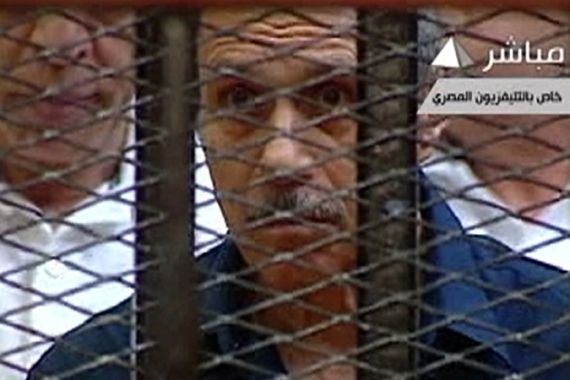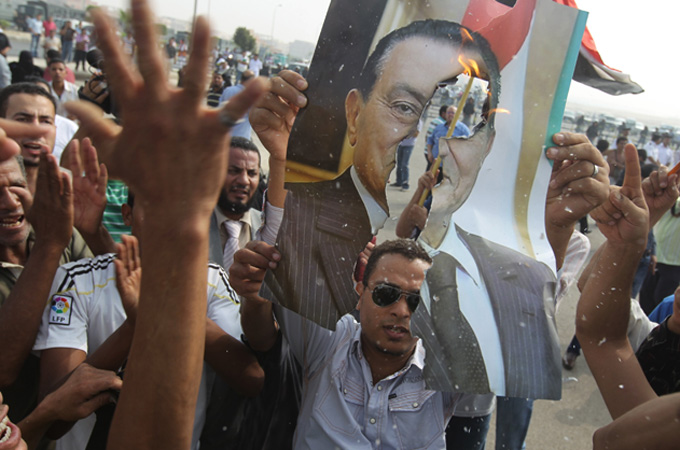Witness implicates el-Adly in Egypt deaths
Egypt’s ex-interior minister told police to use live ammunition against protesters, witness says during Mubarak trial.

 |
| Previous sessions of the trial have been held amid chaotic scenes, with protesters demonstrating outside court [AFP] |
The fifth session in the trial of Hosni Mubarak, the former Egyptian president, has adjourned in Cairo until Sunday after hearing testimony from witnesses from the Central Security Forces.
According to state television, one of the witnesses said that Habib el-Adly, the former interior minister, ordered protesters to be dispersed by any means during the 18-day uprising that led to Mubarak’s downfall in February.
Essam Shawky, a lieutenant colonel and the prosecution’s eighth witness, also said that “El-Adly ordered internet and the phone service cut”.
Al Jazeera’s Sherine Tadros, reporting from outside the court in Cairo, said: “It was finally a good day for the prosecution, [Shawky] testified that he had heard from other police officers that there were orders given by el-Adly for police officers to use live ammunition against protesters during the revolution.
“He also talked about the crucial meeting that happened on the 27th of January, the night before the big Friday protest, where el-Adly had reportedly told police officers to use any means necessary without having to consult with their superiors to confront and stop the protests.”
Our correspondent added that General Hassan Abdel Hameed, a former assistant to el-Adly, then took the stand, echoing much of what Shawky had said and saying that any orders to use force must have come from el-Adly himself.
When asked if he had a comment about Shawky’s testimony, Mubarak told the judge that he has no comment.
El-Adly told the judge that the testimony was completely incorrect, state TV said.
In sessions on Wednesday and Monday, the first five prosecution witnesses, who were all senior security officers, came under suspicion of altering their testimony.
Based on earlier accounts, prosecutors had expected them to directly confirm orders were issued to shoot protesters with live ammunition, but instead they denied knowledge of such orders.
The 83-year-old Mubarak is on trial on charges of complicity in the deaths of protesters and corruption.
The judge has banned the trial from being televised.
Tantawi testimony
When the trial resumes on Sunday, the court will hear from Field Marshal Mohammed Tantawi, who heads the military council in charge of Egypt since the uprising.
“What is expected, is that the field marshal’s testimony, as well as Sami Anan [Armed Forces Chief of Staff] and the remaining witnesses will be the backbone of the evidence against Mubarak.
“Had he given orders to shoot or not and did he in fact know everything about the happenings of the revolution or not,” Mohamed Mahmoud, a prosecution lawyer, said.
Tantawi has said in earlier public comments that the military refused to fire on protesters – a sign many read as meaning he refused orders to do so from his commander-in-chief.
But Tantawi has also appealed for the public to “leave the past aside”, seen as a sign he wants leniency for Mubarak.
Testifying at the landmark trial could give Tantawi a chance to boost his image in the face of growing public criticism that the military remains too close to Mubarak’s former regime.
It also injects new seriousness into a trial that many saw as running aground amid confusion and allegations of perjury.
Among the others summoned by the court is Omar Suleiman, who was appointed vice-president by Mubarak during the uprising and was his powerful intelligence chief and a close aide for nearly two decades.
Protesters have called for a large-scale rally, their first in more than a month, for this Friday, dubbing it “Correcting the Course,” to call for an end to military rule, among other demands.
Death sentence
If the trial brings evidence of a direct order from Mubarak for lethal force to be used, that would boost pressure for a death sentence if convicted.
 |
| Click here for our live blog on the trial |
But if responsibility is seen as less direct – such as a failure to try to stop killings – a conviction would likely bring a lighter sentence.
Mubarak has denied any responsibility for himself or his security forces.
He told investigators before the trial that there was “chaos” and that police and protesters were attacking each other.
When asked why he did not stop the violence, he said, “No one would have paid any attention to me or my orders.”
On trial with Mubarak abd el-Adly are six senior security officials. Mubarak and his two sons, Alaa and Gamal, also face corruption charges.